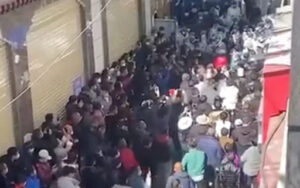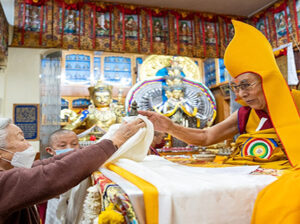 The residents of Lhasa, the capital city of Tibet, took to the streets on October 26 to protest against the strict lockdown imposed on the city for over two months, reports Radio Free Asia. Their sources said that the protestors warned the Chinese authorities of “setting off a fire” if lockdown restrictions are not lifted. RFA reports that it is the first known protest in Lhasa since the protests across Tibetan regions which took place in 2008 to mark Tibetan Uprising day; that protest was crushed by the Chinese military and police, killing hundreds of Tibetans in the process.
The residents of Lhasa, the capital city of Tibet, took to the streets on October 26 to protest against the strict lockdown imposed on the city for over two months, reports Radio Free Asia. Their sources said that the protestors warned the Chinese authorities of “setting off a fire” if lockdown restrictions are not lifted. RFA reports that it is the first known protest in Lhasa since the protests across Tibetan regions which took place in 2008 to mark Tibetan Uprising day; that protest was crushed by the Chinese military and police, killing hundreds of Tibetans in the process.
This current protest has hit the global media, with the British BBC giving it full and prominent coverage, quoting Radio Free Asia and commenting under the headline China Covid: Videos emerge of rare protests in Tibetthat “Wednesday’s protest is said to be the biggest the city has seen since an uprising in 2008 […] Chinese security forces were accused of using both brutal beatings and lethal force against protesters back then. In the wake of that incident, Tibet was closed to foreigners and tens of thousands of Chinese soldiers were sent to the region […] Rights groups say China continues to violate human rights, accusing Beijing of political and religious repression. Beijing denies any abuses.”
A video shared by RFA shows crowds of both Tibetan and Chinese people gathered in the streets, both the Tibetan and Chinese languages can be heard of the video, while several officers in Covid-19 protection suits stood by.
Sources informed RFA’s Tibetan service that protestors have warned the authorities that if restrictions are not lifted they would be “setting fire”, but it is not clear what they are referring to. Another source revealed that Tibetans in Lhasa fear that the argument between civilians and the Chinese police could escalate into violence.
Based on the street signs and restaurant names visible in the video, RFA reports the locations of the demonstration were streets in the Chakrong area in Lhasa’s Chéngguān district in the eastern part of the city, and also in the Payi area of the city.
The Covid-19 lockdown was imposed in Lhasa and neighbouring regions in line with the Chinese government’s Zero-Covid policy; no preparation or policies were in place beforehand for handling the lockdown. The grievances of Tibetans living under lockdown conditions have been shared on various Chinese media platforms.




 Print
Print Email
Email